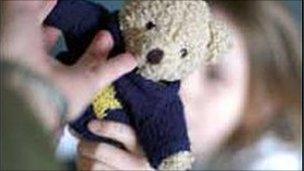Fair pay call for kinship carers
- Published

Children are looked after by kinship carers when their parents are unable to care for them
A wide variation has been discovered in the level of payments made by Scottish local authorities to kinship carers.
These are family members, often grandparents, who look after children because parents are unable to do so.
Citizens Advice Scotland, which carried out the study, said about 13,400 children are looked after by kinship carers - mainly family members.
It said some councils make no payments while others give rates which vary between £23 and £148 per week.
In its report "Relative Value", Citizens Advice Scotland said a third of the parents who cannot look after their children struggle because of addiction issues.
And it said 13% were unable to do so because they were in jail.
Under the Concordat between local authorities and the Scottish government, councils agreed to pay kinship carers an amount equivalent to that received by foster carers.
Some councils have not done so.
Among those that have, payments vary widely.
Citizens Advice said councils should recognise kinship carers keep families together.
It said many carers, a quarter of whom are over 50, took on their responsibilities while also having to deal with their own children.
Scottish Conservative MSP Liz Smith said the report was "disturbing".
She said: "I think many people will fail to understand why some local authorities make no payments whatsoever and why there is such a wide variation in those local authorities who do make payments. This seems totally unfair.
"We must not underestimate the contributions to families made by kinship carers. They do a wonderful job, often in difficult circumstances, and as many of them are grandparents who are on limited incomes, they need support.
"The Scottish Government needs to address the fact that this situation is yet another failure of the Concordat."
Labour's children's spokeswoman Karen Whitefield said the Scottish government promised to address the issue two years ago.
She said: "The SNP have broken many promises on education but the kinship care betrayal is probably the most cynical.
"These statistics show the absolute failure of the concordat to deliver for vulnerable young people. They also expose the cynicism of SNP ministers to have offered false hope to kinship carers with kind words but no action to actually help them."